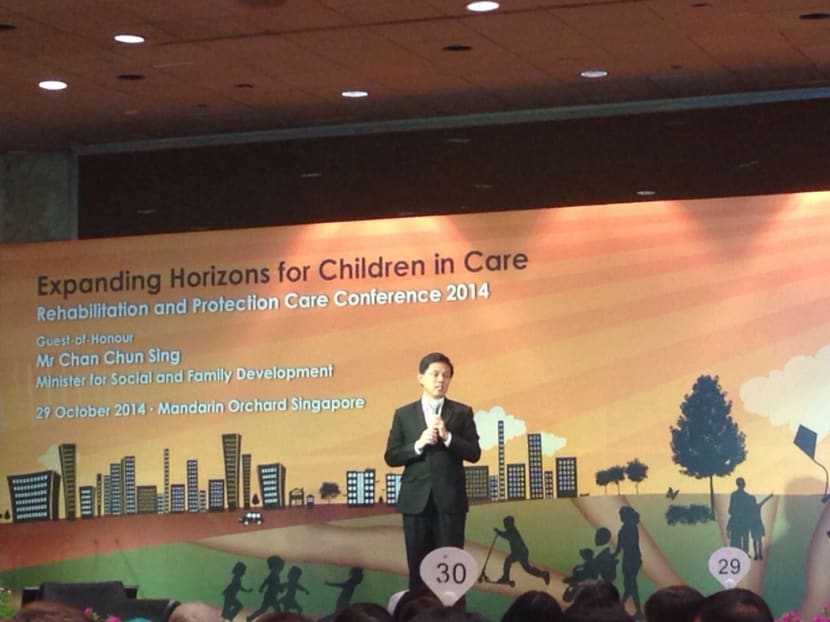More vulnerable children, youth to be placed with foster families
SINGAPORE — The Ministry of Social and Family Development (MSF) is seeking to move more vulnerable children and youths living in institutional homes into the care of foster families, with the aim of doubling the number of foster parents over the next few years.

Social and Family Development Minister Chan Chun Sing speaking at the fourth Rehabilitation and Protection Care Conference. Photo: Laura Elizabeth Philomin
SINGAPORE — The Ministry of Social and Family Development (MSF) is seeking to move more vulnerable children and youths living in institutional homes into the care of foster families, with the aim of doubling the number of foster parents over the next few years.
To that end, it announced today (Oct 29) an S$8 million three-year pilot that would appoint voluntary welfare organisations (VWOs) to set up fostering agencies. From next year, the appointed agencies will help to recruit more foster parents, and provide better support services for them in the form of counselling and training, for example.
Currently, the MSF is the only formal provider of foster care. There are over 235 foster parents in its existing Fostering Scheme, and it intends to increase the number 500. The aim is for more of the 700 to 800 children in the 23 children’s homes to join the existing 325 children placed with foster families.
Social and Family Development Minister Chan Chun Sing noted that despite the best efforts, the institutional environment in children’s homes is “artificial at best”. “If we believe that a homely environment is best for our children, then it’s incumbent upon us to do what we can to see how we can generate this more homely environment for low-risk children in need,” he said at the Rehabilitation and Protection Care conference at Mandarin Orchard hotel.
Mr Chan noted that many Singaporeans are apprehensive about taking on the responsibility of fostering. “Our challenge is to learn from others to see how we can better support foster families and encourage more to come onboard,” he said.
While the Fostering Scheme caters mainly to children below six, the MSF hopes the expanded pool of foster parents will give older children more chances of being placed with foster families.
Under the pilot programme, those applying to be foster parents will have to undergo a stringent screening and assessment process by the fostering agencies, after which the MSF will give the final approval.
Applicants must also fulfill several criteria, such as being a Singapore resident, preferably married, with a minimum household income of S$2,000, and have experience caring for children.
They will also have to show that their household members have the ability to meet the children’s needs, and assessments on their eligibility include home visits and interviews.
The Fostering Scheme provides a monthly allowance to cover basic needs of the children, such as food, clothes, transport and school fees.
While the scheme caters mainly to children aged six and below, the MSF hopes the expanded pool of foster parents will give older children and youths more chances of being placed with foster families.
Sister Marilyn Lim, chairman of Canossaville Children’s Home, said fostering older children, especially teenagers, can be challenging as they “carry along with them a lot of baggage ... a lot of pain”. These children need to be given the opportunity “to work out their issues first”, said Sister Marilyn, whose home is keen to join the MSF pilot.
Ms Irene Loi, executive director of Boys’ Town — one of the VWOs invited to become foster agencies — said it would be a challenge to maintain a pool of foster parents, since their own family circumstances tend to change. “A family may sign up now but ... they drop out of the scheme and we have recruit new ones to replace,” she said.
Some foster parents told TODAY that they welcomed more avenues of support available in the pilot programme.
Retiree Yap Nyat Yong, 69, said parenting skills workshops have helped her raise her two foster children for over 10 years. Looking forward to more training courses that will be offered by the fostering agencies, Madam Yap said the support is still needed even as the foster children grow older.
Madam Sarimah Amat, who has three children of her own and two foster children, said fostering is “quite an effort”, and counselling courses to help her deal with her own emotions would be useful.
Referring to her own previous experience with a special needs foster child, the 47-year-old housewife said: “You need certain skills and training to handle special children. I think I would have been more confident if I had the necessary skills, then I would know how to handle the child better.”






